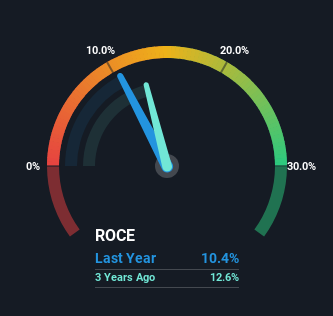- United Kingdom
- /
- Consumer Durables
- /
- LSE:BKG
Investors Could Be Concerned With Berkeley Group Holdings' (LON:BKG) Returns On Capital
What are the early trends we should look for to identify a stock that could multiply in value over the long term? Firstly, we'd want to identify a growing return on capital employed (ROCE) and then alongside that, an ever-increasing base of capital employed. This shows us that it's a compounding machine, able to continually reinvest its earnings back into the business and generate higher returns. In light of that, when we looked at Berkeley Group Holdings (LON:BKG) and its ROCE trend, we weren't exactly thrilled.
Return On Capital Employed (ROCE): What Is It?
Just to clarify if you're unsure, ROCE is a metric for evaluating how much pre-tax income (in percentage terms) a company earns on the capital invested in its business. To calculate this metric for Berkeley Group Holdings, this is the formula:
Return on Capital Employed = Earnings Before Interest and Tax (EBIT) ÷ (Total Assets - Current Liabilities)
0.10 = UK£518m ÷ (UK£6.9b - UK£1.9b) (Based on the trailing twelve months to April 2023).
So, Berkeley Group Holdings has an ROCE of 10%. That's a relatively normal return on capital, and it's around the 11% generated by the Consumer Durables industry.
See our latest analysis for Berkeley Group Holdings

Above you can see how the current ROCE for Berkeley Group Holdings compares to its prior returns on capital, but there's only so much you can tell from the past. If you're interested, you can view the analysts predictions in our free report on analyst forecasts for the company.
How Are Returns Trending?
When we looked at the ROCE trend at Berkeley Group Holdings, we didn't gain much confidence. To be more specific, ROCE has fallen from 27% over the last five years. However it looks like Berkeley Group Holdings might be reinvesting for long term growth because while capital employed has increased, the company's sales haven't changed much in the last 12 months. It may take some time before the company starts to see any change in earnings from these investments.
The Key Takeaway
To conclude, we've found that Berkeley Group Holdings is reinvesting in the business, but returns have been falling. And with the stock having returned a mere 27% in the last five years to shareholders, you could argue that they're aware of these lackluster trends. So if you're looking for a multi-bagger, the underlying trends indicate you may have better chances elsewhere.
If you want to know some of the risks facing Berkeley Group Holdings we've found 2 warning signs (1 is significant!) that you should be aware of before investing here.
If you want to search for solid companies with great earnings, check out this free list of companies with good balance sheets and impressive returns on equity.
Valuation is complex, but we're here to simplify it.
Discover if Berkeley Group Holdings might be undervalued or overvalued with our detailed analysis, featuring fair value estimates, potential risks, dividends, insider trades, and its financial condition.
Access Free AnalysisHave feedback on this article? Concerned about the content? Get in touch with us directly. Alternatively, email editorial-team (at) simplywallst.com.
This article by Simply Wall St is general in nature. We provide commentary based on historical data and analyst forecasts only using an unbiased methodology and our articles are not intended to be financial advice. It does not constitute a recommendation to buy or sell any stock, and does not take account of your objectives, or your financial situation. We aim to bring you long-term focused analysis driven by fundamental data. Note that our analysis may not factor in the latest price-sensitive company announcements or qualitative material. Simply Wall St has no position in any stocks mentioned.
About LSE:BKG
Berkeley Group Holdings
The Berkeley Group Holdings plc, together with its subsidiaries, builds homes and neighbourhoods in the United Kingdom.
Excellent balance sheet and fair value.
Similar Companies
Market Insights
Community Narratives



